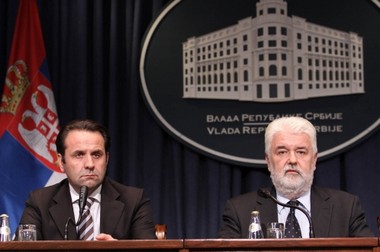Q:
A:
Government adopts social care plan
Belgrade,
27 August 2009
Serbian Prime Minister Mirko Cvetkovic stated that the government today adopted the social care plan aimed at protecting the legal rights of employees and facilitating the dialogue between them and their employers.
Cvetkovic told a press conference following the government session that the government decided to settle the pension and disability insurance debts for employees of state-owned and privatised companies, explaining that the set of measures also implies settling health care debts.
The Prime Minister announced that in future the control and regulations system will be altered in order to ensure that all health insurance contributions are paid regularly.
He stated that the government decided to set aside funds to help the most endangered workers, those who have not been their receiving salaries, as well as to reprogram public companies’ electricity debts, adding that activities have been defined to prevent similar misuse during the privatisation process.
Cvetkovic said that all measures will be put into force immediately, except for the one enabling employees to link their years of service because the law needed for that is to be adopted in October.
The government decided to draft an agreement on special partnership, to be signed by unions and employers, the Prime Minister said, adding that the government has also defined the criteria under which public gatherings can be held.
He said the government does not fear social unrest but simply believes that this sector should be put into order.
This measure does not forbid gatherings, but simply defines, since they are, after all, an achievement of democratic society, Cvetkovic said.
He stressed that this year’s budgetary deficit will be covered by additional taxes and loans from international financial institutions, as well as the EU’s assistance and favourable banking loans.
He stressed that the talks with IMF representatives are being held in a pleasant atmosphere, adding that currently each provision is being thoroughly debated at expert level.
Speaking about funding to cover the deficit, Cvetkovic said that the state is borrowing from commercial banks at an interest rate of lower than 6%, which is very favourable, though rates for loans granted by international financial institutions are even more favourable, namely three to four times lower than those granted by banks.
Another possibility Serbia might resort to is the additional $500 million available from the IMF, which it could use if necessary.
Cvetkovic recalled that the IMF grants funds only for foreign currency reserves, but noted that this is a specific situation and if agreement is reached, Serbia will be able to draw those funds to cover the budgetary deficit.
At today’s session there was no mention of cutting the number of employees in public administration, said Cvetkovic, adding however that this measure has been contemplated for some time as a serious project that will in the short and long-term increase the public administration’s efficiency.
Asked whether the crisis will be over for Serbia by next year, he replied that his subjective opinion is that it will, adding that he is optimistic since there are positive signals pointing in that direction.
Cvetkovic reiterated that the bill amending the Law on public information cannot be changed or withdrawn from procedure because the debate has been completed and voting scheduled.
He noted that this bill was not discussed at today’s session, but added that MPs can state their opinion on it, voicing his belief that the document will garner enough votes in parliament.
Minister of Labour and Social Policy Rasim Ljajic specified at the conference that the set of measures the government adopted will enable workers to link together their years of service for the period from January 1, 2004 until June 30, 2009.
In order to do that, we have to pass the law and the draft law will be completed within 10 days, Ljajic announced voicing his expectation that the government will adopt the document before the end of September and forward it to parliament.
He explained that because health insurance contributions have not been settled by certain companies, the government will set aside RSD 40 million for that purpose.
One-off aid of RSD 5,000 will be allocated to workers who have not received their salaries for more than three months, he added.
These measures are important because they enable us to intensify the social dialogue and the true social partnership in this time of crisis, which is why we believe that once they are adopted and a working group is set up, there will be no need for protests and strikes because this will be the way to discuss and solve individual issues in each company, Ljajic concluded.
The Prime Minister announced that in future the control and regulations system will be altered in order to ensure that all health insurance contributions are paid regularly.
He stated that the government decided to set aside funds to help the most endangered workers, those who have not been their receiving salaries, as well as to reprogram public companies’ electricity debts, adding that activities have been defined to prevent similar misuse during the privatisation process.
Cvetkovic said that all measures will be put into force immediately, except for the one enabling employees to link their years of service because the law needed for that is to be adopted in October.
The government decided to draft an agreement on special partnership, to be signed by unions and employers, the Prime Minister said, adding that the government has also defined the criteria under which public gatherings can be held.
He said the government does not fear social unrest but simply believes that this sector should be put into order.
This measure does not forbid gatherings, but simply defines, since they are, after all, an achievement of democratic society, Cvetkovic said.
He stressed that this year’s budgetary deficit will be covered by additional taxes and loans from international financial institutions, as well as the EU’s assistance and favourable banking loans.
He stressed that the talks with IMF representatives are being held in a pleasant atmosphere, adding that currently each provision is being thoroughly debated at expert level.
Speaking about funding to cover the deficit, Cvetkovic said that the state is borrowing from commercial banks at an interest rate of lower than 6%, which is very favourable, though rates for loans granted by international financial institutions are even more favourable, namely three to four times lower than those granted by banks.
Another possibility Serbia might resort to is the additional $500 million available from the IMF, which it could use if necessary.
Cvetkovic recalled that the IMF grants funds only for foreign currency reserves, but noted that this is a specific situation and if agreement is reached, Serbia will be able to draw those funds to cover the budgetary deficit.
At today’s session there was no mention of cutting the number of employees in public administration, said Cvetkovic, adding however that this measure has been contemplated for some time as a serious project that will in the short and long-term increase the public administration’s efficiency.
Asked whether the crisis will be over for Serbia by next year, he replied that his subjective opinion is that it will, adding that he is optimistic since there are positive signals pointing in that direction.
Cvetkovic reiterated that the bill amending the Law on public information cannot be changed or withdrawn from procedure because the debate has been completed and voting scheduled.
He noted that this bill was not discussed at today’s session, but added that MPs can state their opinion on it, voicing his belief that the document will garner enough votes in parliament.
Minister of Labour and Social Policy Rasim Ljajic specified at the conference that the set of measures the government adopted will enable workers to link together their years of service for the period from January 1, 2004 until June 30, 2009.
In order to do that, we have to pass the law and the draft law will be completed within 10 days, Ljajic announced voicing his expectation that the government will adopt the document before the end of September and forward it to parliament.
He explained that because health insurance contributions have not been settled by certain companies, the government will set aside RSD 40 million for that purpose.
One-off aid of RSD 5,000 will be allocated to workers who have not received their salaries for more than three months, he added.
These measures are important because they enable us to intensify the social dialogue and the true social partnership in this time of crisis, which is why we believe that once they are adopted and a working group is set up, there will be no need for protests and strikes because this will be the way to discuss and solve individual issues in each company, Ljajic concluded.












